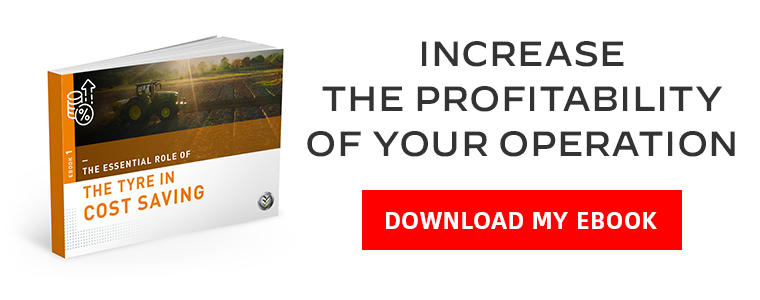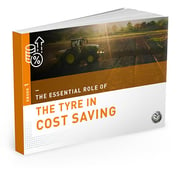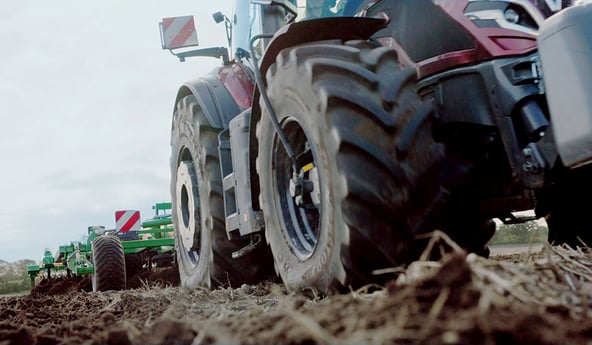The quality of your harvest depends on the quality of your soil. What cannot be seen, such as excess soil compaction, should nonetheless not be ignored.
After the harvest, soil preparation is very important to restore the soil’s production capacities and ensure good yields for the following season. But preparing the soil is not enough if your machines start compacting the soil again when they next drive over it. You need to think ahead and make sure that you protect the preparation work that has been done.
Tyres that are adapted to your soil, which have a low impact on compaction, are therefore absolutely essential if you wish to avoid your soil deteriorating progressively over time due to successive compaction caused by different machine traffic.
Here is what you must take into account to ensure that your tyres have the least impact possible on the fertility of your soil:
1. The arable layer is vital for preserving the soil’s production capacities
The arable layer of soil, which is very rich in organic matter, corresponds to the upper layer of soil in which your crops take root. It plays a key role for the productivity of your land by providing an environment that encourages young plant growth.
Over the years, the arable layer is affected by excessive compaction, the extent of which depends on load and the tyres fitted on your machines. This reduces its permeability and its capacity to accommodate air, water, fertilisers and the treatments necessary for the plants.
This compaction is principally caused by the repeated toing and froing of agricultural machinery over the same areas, which alters the structure of the soil.
The role of biological activity within the soil
Compaction may have a direct impact on the biological activity within the soil. It disturbs the tunnels and natural habitats of earthworms, insects and other micro-organisms…
Yet these organisms are active in maintaining soil health by encouraging its fertility and improving its structure.
The elements that are essential in preserving the soil’s production capacities
The presence of these biological organisms in the soil helps the circulation of organic matter and water, which are essential for plant development.
Good water retention in the arable layer is essential, in particular for coping with dry periods.

Excess compaction can reduce the oxygen content that is necessary for biological life.
The presence of non-compacted spaces in the arable layer stimulates germination, facilitates inputs of the organic matter necessary for the plants and provides an environment conducive to root development. This enables the roots to spread out, to seek all the nutrients they need and to maintain the stability of the soil structure.
In short, non-compacted soil allows for vigorous plant growth and optimises your yields.
Impact of compaction on your crops’ root systems
On the other hand, when the arable layer is compacted, this alters the structure of the soil. The soil aggregates are modified, the pores compressed and the permeability of the soil decreases.
This compaction blocks the circulation of water and the aeration of the deep soil layers, thus limiting root growth capacities.
The infiltration of water becomes difficult, with the soil remaining moist on the surface, leading to more compaction and slip, increased erosion, and the leaching of fertiliser and phytosanitary products on the surface, preventing them from reaching the crops’ root systems.
2. What is the impact of tyres on the soil?
Compaction of the different soil horizons
The progressive compaction of the soil caused by the weight of the machinery and the high pressure of agricultural tyres (to compensate for the weight of the implements), may appear to be insignificant. Yet it can have negative consequences, such as a decrease in yields, which this time will be clearly visible.
Contrary to appearances, this insidious process may lead to a slight, but constant decline in production and, as a result, in your revenues.
When the pressure exerted by the tyres compacts the soil, the crop roots have difficulty penetrating and developing in the arable layer and deeper down. This prevents them from getting access to the nutrients and water in the deeper layers of soil, thus stunting their development.
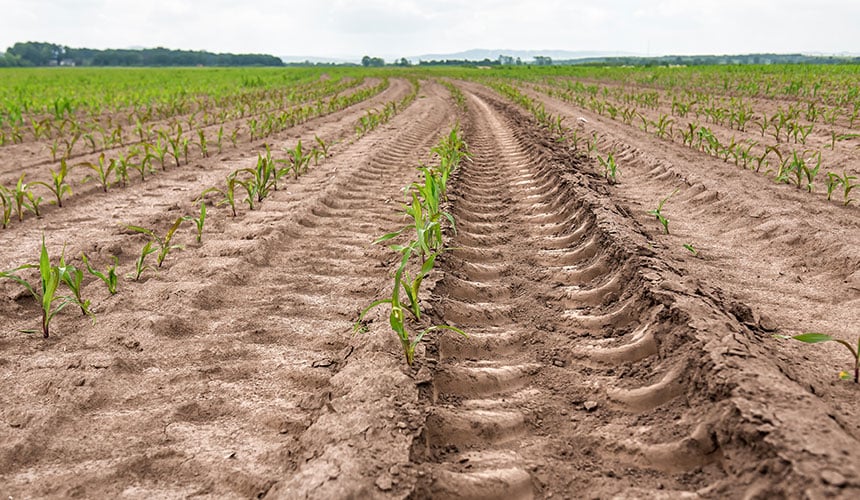
When you use a plough, it works over a width of 3 to 6 metres, depending on the model.
If you are fitted with 650 tyres, the impact to the ground will cover 20% of the surface.
However, if the tyres are unsuitable and cause excess compaction, this will lead to a drop in yields of around 15% over this 20% surface area.
A slip ratio that may increase
It’s normal to increase the inflation pressure in your tractor tyres to offset the load and the weight of your implements.
However, when the tyres are overinflated, they tend to sink into the ground rather than stay on the surface, which reduces the tyres’ grip surface. Rolling resistance is therefore greater, while grip is reduced, which inevitably leads to more slip.
This factor alters both working time and the quality of the work carried out, as well as the structure of the arable layer of soil.
3. The advantages of VF tyres for soil preservation
The harvesting campaign is certainly the operation that generates the most compaction. It is therefore necessary to prepare the soil before replanting. There are several ways of carrying out this preparation work depending on how compacted your land is: subsoiling or soil aeration work, tilling, cover crop, stubble plough, combined tools for direct seeding…
Tillage aims to restore the soil’s production capacities, to reduce compaction and to prepare it for new seeding, by making sure that conditions are optimal for the growth of new crops.
For tilling, the VF tyre offers excellent motricity
For compacted soil, tilling allows you to work over a depth of 30 cm and bury the weeds with a good preparation of the seed bed.
Motricity is essential for tilling. Unlike standard agricultural tyres, VF tyres have a much larger grip surface. The soil footprint is much wider and longer, which leads to excellent motricity and provides a far better traction capacity.
These high-tech tyres have optimal grip which facilitates tilling without the risk of slip or compaction.
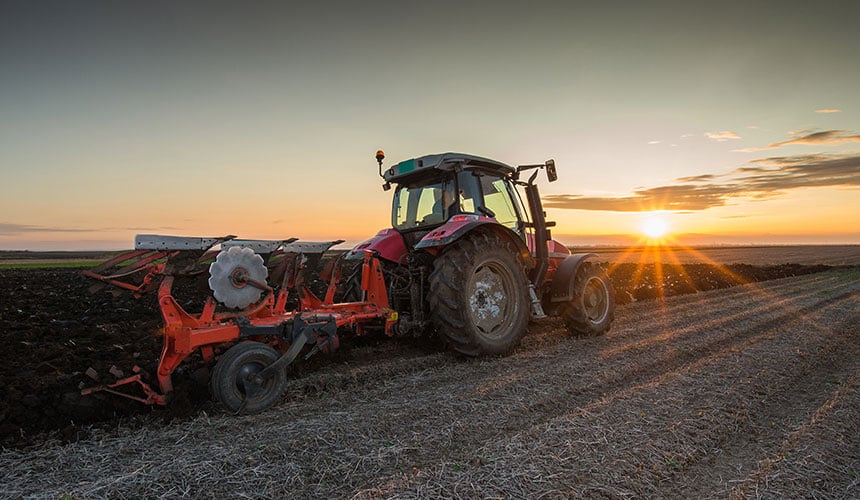
and reduce slip during tilling
Stubble disc cultivator or cover crop to work at a depth of up to 15 cm
If the soil is only compacted on the surface, a stubble cultivator or cover crop disc harrow will allow you to till the arable layer up to 15 or 20 cm down and incorporate the earth and plant residue correctly. Here again, the VF tyre plays a crucial role.
It allows you to work at 15 km/h with excellent motricity at low pressure, while protecting the soil from compaction. This means that you can work rapidly and more economically than ploughing, while preserving the quality of your soil.
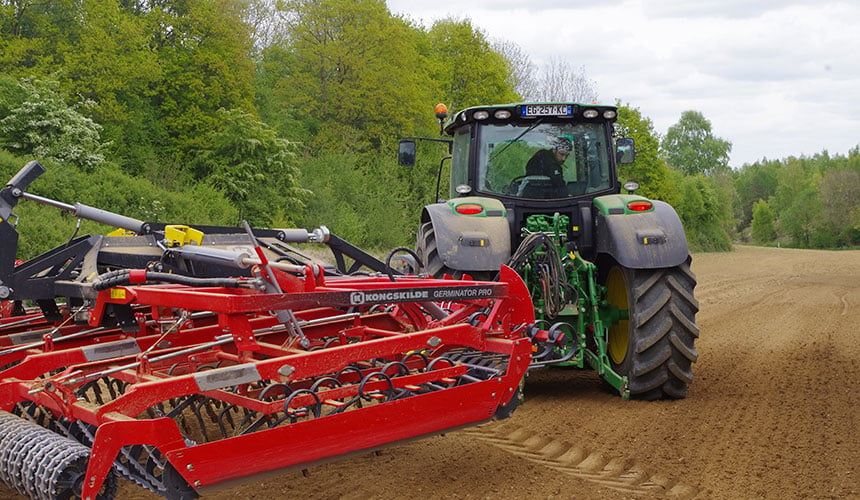
For direct seeding: the VF tyre protects your soil by avoiding compaction
For non-compacted soil, where you wish to protect the biological soil life as much as possible, direct seeding on top of the previous crop’s residues will be perfect.
The VF technology tyre is also a great asset for direct seeding, where soil care and preservation are vital. The VF tyre allows your tractor to work at 0.8 bar or even 0.6 bar to protect the structure of the soil while optimising its production capacities.
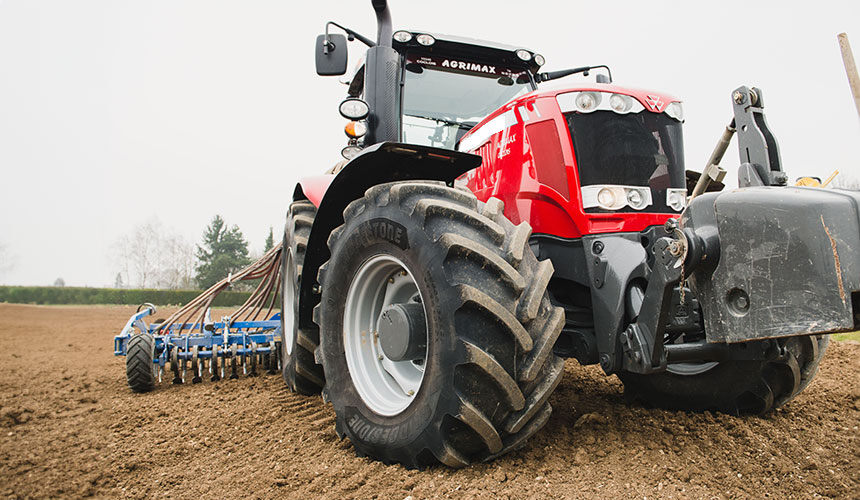
The use of a VF tyre is optimal if you choose the right settings
There is no point in fitting VF tyres if you don’t choose the right pressure settings to optimise your efficiency, depending on the implement used as well as the moisture content and type of soil on your farm.
It is always advisable to determine the total weight of the tractor plus implement, then adjust the inflation pressure in the tyres accordingly.
The use of VF tyres at very low pressure to avoid excess soil compaction while preserving the primary qualities of the soil is also dependant on your load and the speed at which you drive.
4. The VF VT-TRACTOR agricultural tyre preserves the soil’s production capacities
The VF VT-TRACTOR tyre is an ideal solution for preserving your soil’s production capacities and making sure your yields remain high over time.
This high-tech tyre, developed by Bridgestone, offers many advantages:
Optimal reduction of soil compaction
The VF VT-TRACTOR tyre was especially designed to reduce soil compaction at the level of the arable layer, as well as to prevent deep soil compaction.
It has a unique casing structure which allows it to work at very low pressure and to spread the load over a larger surface area, thus limiting the risk of compaction in the different soil horizons.
Its longer, wider soil footprint helps preserve the porosity of your soil as well as its capacity to accommodate the air, water and nutrients necessary for crop development.
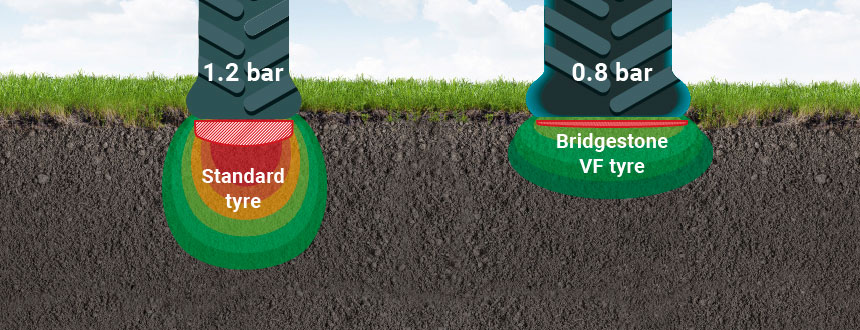
Higher load capacity
Thanks to its robust design, the VF VT-TRACTOR tyre can carry up to 40% more load than a standard tyre with the same inflation pressure.
This extra load capacity does not alter the efficiency or longevity of the tyre, and ensures optimal productivity thanks to the bigger or wider implements that can be used.
Better protection of the arable layer
One of the VT-TRACTOR tyre’s main special features is its ability to preserve the arable layer of soil. Thanks to the specific design of its Involute lugs, this innovative tyre has an optimal grip on the ground, which improves traction and reduces slip.
The size, angle and thickness of the lugs enables excellent penetration into the ground, reducing soil disturbance and damage to the soil structure.
CONCLUSION
Soil preparation after the harvest will not be enough if you are not equipped with good tyres. Preserving your soil must become a habit to ensure that each trip that you make with your machine through the fields does not result in soil damage. It may seem like a major investment to buy VT-TRACTOR tyres, but in the end you will come out on top. In addition to preserving the arable layer of soil and reducing compaction, this premium tyre helps you work on a more sustainable basis. Its benefits span over several years of production during which yields are preserved or even boosted.
The bridgestone-agriculture.eu blog is written and administered by tractor tyre experts who can provide you with advice to help you achieve optimum productivity (Technical data on agricultural tyres - Agricultural tyre performance - Advice on agricultural tyre pressure - Soil compaction prevention - Sprayer tyre pressure - etc.)
To take it a step further and increase your farm’s profitability, the blog Bridgestone-agriculture.eu has prepared a free, highly detailed ebook which explains the essential role of the agricultural tyre on your productivity.
Most people who read this article have also read some of the following articles:
- 9 major points on soil compaction linked to tractor tyres
- How to reduce soil compaction after harvesting?
- What are the consequences of the soil compaction caused by my tractor tyres?
- 3 soil conditions to understand to avoid compaction by your tractor tyres
- What type of farming tyre is best for preventing ruts?
- Expert opinion on soil compaction caused by tractor tyres
- Demonstration of soil compaction linked to your tractor tyres
- Why analyse the soil footprint of your agricultural tyres?
- Which agricultural tyre helps you to preserve soil fertility?
- Technological farming innovations to avoid soil compaction
This information is intended only to make you aware of the technical and functional aspects of agricultural tires and their use. It does not allow you to make a judgment or a definitive conclusion on a given problem. Only your agricultural tire expert is able to make a technical assessment and take a final decision, case by case.
Leave a
commentary
Your email address will not be published.
Required fields are indicated with *



